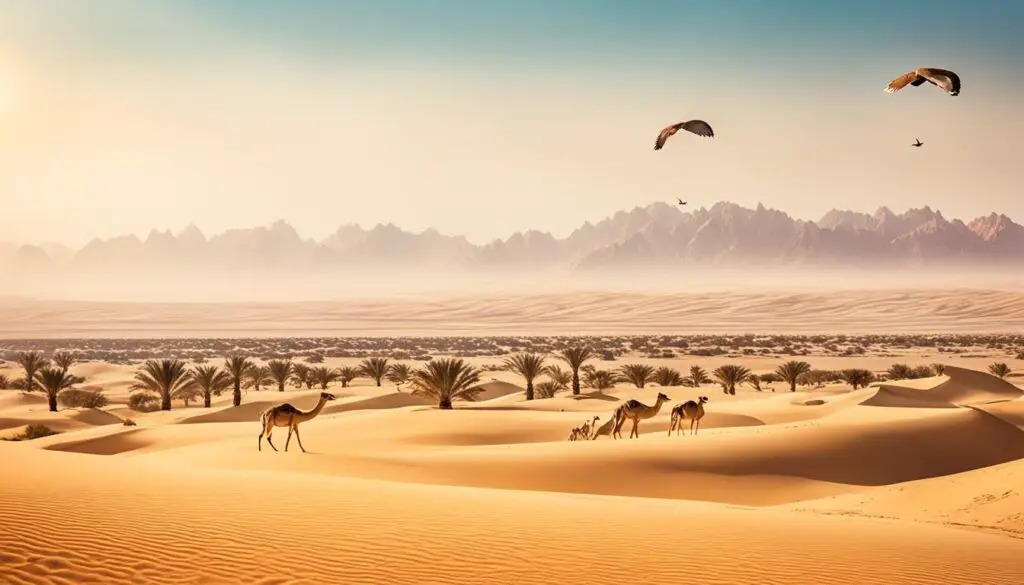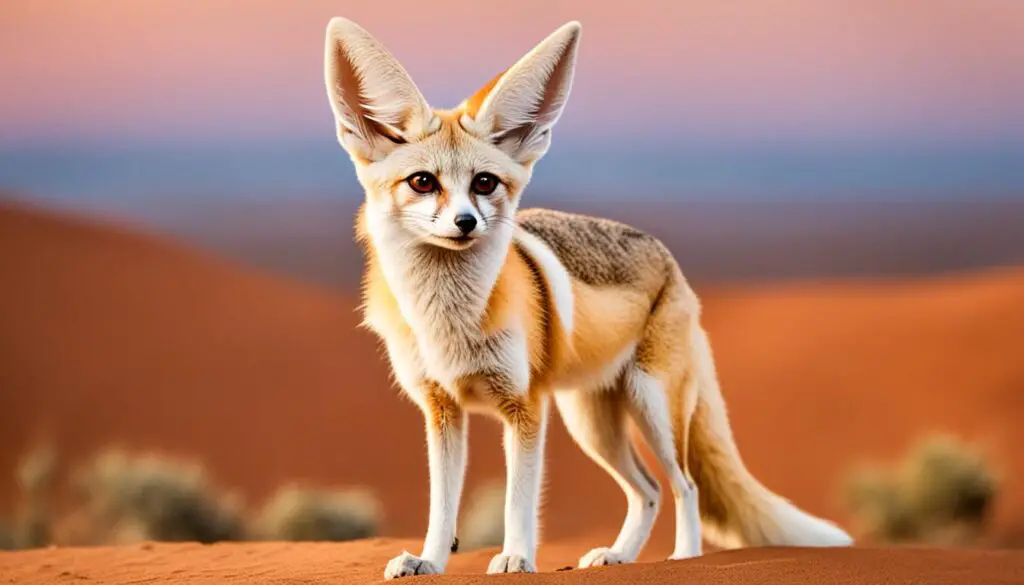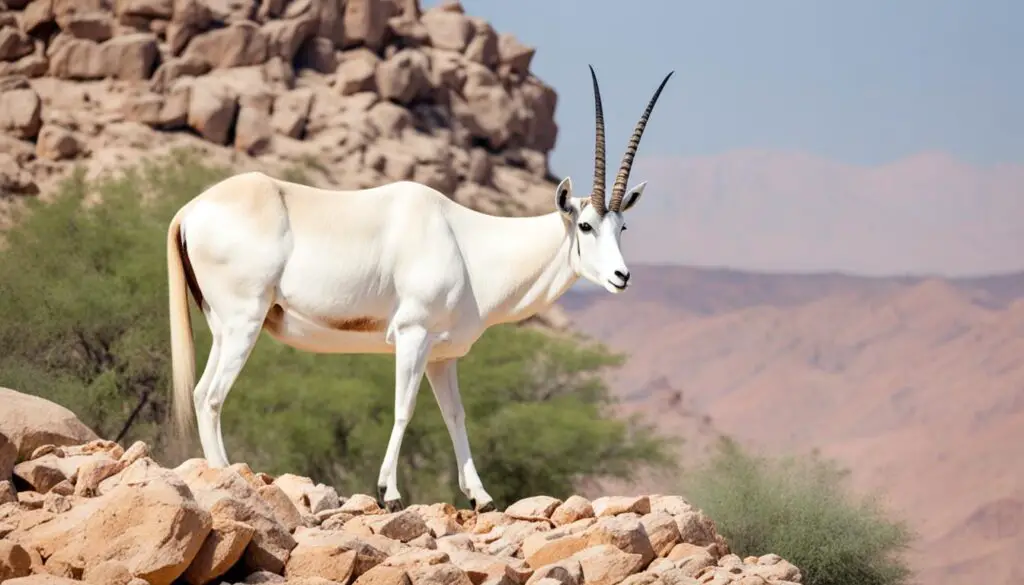Did you know that Qatar, a tiny country located in the heart of the Arabian Peninsula, is home to a remarkable variety of wildlife? Despite its desert landscape, Qatar boasts an incredible array of animal species that have adapted to survive in this challenging environment. From majestic desert foxes to graceful gazelles, Qatar is a treasure trove of biodiversity waiting to be discovered.

Key Takeaways:
- Qatar is a haven for diverse animal species, despite its arid desert climate.
- The wildlife in Qatar includes a wide range of terrestrial and marine creatures.
- Conservation efforts are in place to protect native wildlife and endangered species.
- Qatar animal sanctuaries play a crucial role in preserving biodiversity.
- Appreciating and supporting wildlife conservation is vital for preserving Qatar’s rich ecosystem.
Native Wildlife in Qatar
In Qatar, the native wildlife represents a rich tapestry of diverse animal species that thrive in this unique ecosystem. From the deserts to the coastline, Qatar is home to a myriad of terrestrial and marine creatures, each playing a vital role in maintaining the delicate balance of the ecosystem.
On land, one can encounter a variety of fascinating species. Among the notable animals found in Qatar are the Arabian oryx, a majestic antelope with impressive curved horns, and the Arabian gazelle, known for its slender build and graceful movements. The desert fox, with its bushy tail and sharp features, also roams the arid landscapes of Qatar.
Qatar’s coastal waters are teeming with life as well. The Arabian Gulf offers a thriving habitat for marine creatures such as the green sea turtle, the Arabian Gulf humpback whale, and the dugong. These captivating marine animals contribute to the vibrant biodiversity of Qatar’s coastal zones.
To get a better understanding of the native wildlife in Qatar, take a closer look at the table below, which highlights some of the fascinating animal species found in different habitats across the country.
Native Wildlife Species in Qatar
| Habitat | Terrestrial Species | Marine Species |
|---|---|---|
| Desert | Arabian Oryx, Desert Fox, Sand Gazelle | – |
| Coastline | – | Green Sea Turtle, Arabian Gulf Humpback Whale, Dugong |
| Wetlands | Flamingo, Marsh Harrier | – |
While the table above provides a snapshot of the native wildlife in Qatar, it’s important to note that there are numerous other species not listed here. Qatar’s commitment to wildlife conservation ensures the protection of these animals and their habitats, fostering a sustainable environment for both present and future generations.
Qatar Desert Animals
Qatar’s arid climate is home to a unique array of desert animals that are remarkably adapted to survive in this challenging environment. These fascinating creatures have evolved special features and behaviors that enable them to thrive in the harsh desert conditions.
Camels
One of the most iconic desert animals in Qatar is the camel. Known for their ability to endure long periods without water, camels have humps that store fat, which they utilize as a source of energy and hydration. These hardy creatures are highly valued by the Bedouin people, who have relied on them for transportation, milk, and meat for centuries.
Arabian Oryx
The Arabian Oryx is another remarkable desert dweller found in Qatar’s vast sandy landscapes. With its striking white coat and long, slender horns, the Arabian Oryx is a symbol of beauty and resilience. These magnificent creatures have the ability to conserve water by reducing urine production and recycling moisture from their breath, allowing them to survive in the water-scarce desert environment.
Desert Foxes
Desert foxes, also known as fennec foxes, are small nocturnal animals that are uniquely adapted to desert life. With their large ears, they can dissipate heat and detect prey underground. These resourceful creatures are highly skilled at locating food in barren landscapes and have the ability to survive in extreme temperatures, ranging from scorching hot days to freezing cold nights.
Sand Gazelles
The sand gazelle, also known as the mountain gazelle, is a graceful creature that roams the sandy plains and rocky hills of Qatar. These agile animals have adapted to the desert environment by developing long, slender legs that allow them to swiftly navigate the challenging terrains. Sand gazelles have keen senses that help them detect predators and locate sources of water in the arid landscapes.
To get a glimpse of the extraordinary Qatar desert animals, visitors can explore the country’s nature reserves and protected areas. These sanctuaries offer a chance to observe these magnificent creatures in their natural habitats, while also promoting conservation efforts to preserve these unique species for future generations.

Wildlife Conservation in Qatar
In Qatar, wildlife conservation is a top priority as the country aims to protect its diverse and unique animal species. Various initiatives, organizations, and policies have been implemented to preserve natural habitats and safeguard endangered wildlife.
Protected Areas and Wildlife Reserves
One of the key conservation efforts in Qatar is the establishment of protected areas and wildlife reserves. These areas serve as havens for native wildlife, allowing them to thrive in their natural habitats. For example, the Al Reem Reserve is home to Arabian oryx, sand gazelles, and other desert species.
Qatar Green Building Council
The Qatar Green Building Council (QGBC) plays a crucial role in wildlife conservation through its sustainable development initiatives. By promoting environmentally-friendly practices in construction and urban planning, the QGBC aims to minimize the impact on wildlife habitats and create harmonious spaces for both humans and animals.
Conservation Research and Education
Research and education play vital roles in wildlife conservation efforts. Qatar supports various research projects focused on understanding animal behavior, population dynamics, and habitat requirements. Additionally, educational programs raise awareness about the importance of wildlife conservation among the public and inspire future generations to become stewards of the environment.
Collaboration with International Conservation Organizations
Qatar actively collaborates with international conservation organizations to strengthen wildlife conservation efforts. These partnerships facilitate the exchange of knowledge, expertise, and resources, leading to effective strategies for preserving Qatar’s unique biodiversity.
| Organization | Mission | Key Initiatives |
|---|---|---|
| Qatar Museums | To promote cultural heritage and environmental preservation | Conservation and research programs, awareness campaigns |
| Friends of the Environment Centre | To support sustainable development and environmental conservation | Implementation of key conservation projects, workshops and seminars |
| Silatech | To empower and engage youth in wildlife conservation | Youth-led conservation projects, capacity-building initiatives |
Endangered Species in Qatar
Qatar is home to a diverse range of wildlife, but unfortunately, some of these species are facing the threat of extinction. It is crucial that we prioritize their protection to ensure their survival for future generations and maintain the ecological balance of the region.
One of the key strategies in safeguarding endangered species in Qatar is the establishment of animal sanctuaries. These sanctuaries provide a safe haven for vulnerable species and contribute significantly to their conservation efforts. Qatar animal sanctuaries serve as vital habitats and breeding grounds, giving endangered species a chance to recover and thrive.

By creating protected areas and implementing conservation programs, Qatar has taken significant steps towards preserving its endangered species. These dedicated initiatives prioritize the preservation of habitats essential for the survival of these animals and address the various threats they face, such as habitat loss, poaching, and climate change.
In addition to animal sanctuaries, collaboration with international organizations, research institutions, and local communities plays a crucial role in protecting endangered species. These partnerships enable knowledge sharing, research, habitat restoration, and awareness campaigns to educate the public about the importance of conserving Qatar’s rich biodiversity.
Endangered Species in Qatar
Let’s take a closer look at some of the endangered species in Qatar:
| Species | Status |
|---|---|
| Arabian Oryx | Endangered |
| Dugong | Critically Endangered |
| Hawksbill Turtle | Endangered |
| Dhofar Toad | Endangered |
| Sand Gazelle | Endangered |
These are just a few examples of the endangered species that require immediate attention and protection in Qatar. The conservation efforts undertaken by Qatar and its commitment to preserving its natural heritage are commendable.
It is our collective responsibility to support and contribute to these efforts by raising awareness, advocating for stricter conservation policies, and actively participating in wildlife conservation programs. Together, we can make a significant impact and secure a future where endangered species continue to thrive in their natural habitats.
Conclusion
In conclusion, Qatar is home to a diverse array of native wildlife that deserves our admiration and protection. From the Arabian oryx roaming the desert to the magnificent marine creatures found in the surrounding waters, Qatar’s animal diversity is truly remarkable.
Throughout this article, we have highlighted the importance of preserving Qatar’s animal species and their habitats. Conservation efforts play a crucial role in maintaining the delicate balance of the ecosystem and safeguarding endangered species.
We encourage readers to actively support wildlife conservation initiatives in Qatar. By raising awareness, making sustainable choices, and contributing to organizations dedicated to protecting and conserving Qatar’s animal heritage, we can ensure a brighter future for both the wildlife and the people of this beautiful country.
